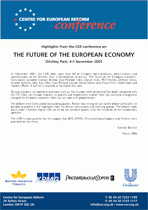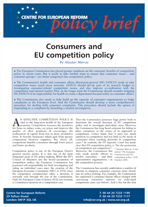The single market & competition policy
A new European mercantilism?
01 August 2008
Europe’s economic liberals have had a successful ten years. There have been protectionist pressures throughout this period, of course.
Liberal reforms are no threat to social Europe
01 April 2008
Europeans have long sought to reconcile markets with social solidarity. The EU’s economic reform programme, the Lisbon agenda, falls squarely within this tradition. Launched in 2000, its vaulting ambition was to turn the EU into the “most competitive and dynamic knowledge-based economy in the world by 2010”.
The Lisbon scorecard VIII: Is Europe ready for an economic storm?
01 February 2008
After more than half a decade of economic gloom, the years 2006 and 2007 restored some much-needed optimism to Europe. Faster GDP growth and falling unemployment were at least partly due to the implementation of structural reform.
European retail banking: Will there ever be a single market?
03 December 2007
Integrated markets for entertainment and communications, as well as nearly all goods, stretch from the Arctic to Cyprus. By contrast, Europe’s retail banking industry remains largely segmented along national lines.
Can the EU learn to live with Chinese mercantilism?
29 October 2007
Not long after its launch, the euro was famously dismissed by a disgruntled currency trader as a “toilet currency”. How things have changed.
The Microsoft appeal: The Commission was right
13 September 2007
On September 17th the European Union’s Court of First Appeal will rule on Microsoft’s long-awaited appeal against the record fine imposed on the company by the Commission in 2004 for abusing its dominant position in computer operating systems.
We are all Nordic now, or are we?
02 April 2007
The EU drew up its Lisbon reform agenda in 2000 with the thinly disguised goal of catching up with the US. But the idea that Europe should strive to adopt ‘Anglo-Saxon’ capitalism is abhorrent to those who cherish Europe’s more extensive welfare states.
The future of the single market
02 March 2007
The EU puts out a lot of reports, studies, evaluations and announcements. So far this month, the Commission has released around 80 major documents. Many of them are too specialised, too long or simply too dull to attract wider interest.
The Lisbon scorecard VII: Will globalistion leave Europe stranded?
01 February 2007
Globalisation and the rapid integration of China and India into the international economy present huge opportunities for the European Union.
The wrong benchmark for Eastern Europe
25 January 2007
In November last year, Anders Aslund, a long-time observer of transition economies, rang the alarm bells over Eastern Europe. In an FT article he talked about “Central Europe’s political malaise” and warned that budget profligacy and reform fatigue would keep the new members from catching up with the West.
What future for free trade in services?
03 April 2006
The controversy that has engulfed the Commission’s draft services directive is hardly surprising: the establishment of a single EU market in services was always going to generate more opposition than the liberalisation of trade in goods.
Ditchley conference note - The future of the European economy
21 March 2006
In November 2005, the CER took more than 40 of Europe's top economists, policy-makers and commentators to the Ditchley Park in Oxfordshire to discuss 'The future of the European economy'. Participants included Graham Bishop, Jean-Philippe Cotis, Daniel Gros, Will Hutton, DeAnne Julius, Anatole Kaletsky, John Kay, Mart Laar, Richard Layard,...
The Lisbon scorecard VI: Will Europe's economy rise again?
01 March 2006
The European Union and its 'Lisbon agenda' of economic reform, have received a battering over the past year. The pace of reform has remained slow in the big eurozone countries.
Consumers and EU competition policy
01 September 2005
An effective competition policy is vital to the long-term health of the European economy. Competition increases the incentives for firms to reduce costs, cut prices and improve the quality of their products.
Liberal versus social Europe
01 August 2005
Europe is in the grip of a fundamental debate about its economic future, or at least that is what some politicians and many journalists would have us believe.
Issue 43 - 2005
29 July 2005
- Liberal versus social Europe, Katinka Barysch
- A bad European dream, Daniel Keohane
- Europe’s social dilemma, Alasdair Murray
Unshackling services is the key to Europe's economic future
03 June 2005
In the last edition of the CER Bulletin, John Monks, secretary-general of the European Trade Union Confederation (ETUC), wrote an interesting and engaging - but in my view incorrect - article on the Commission's draft directive for opening up EU services markets.
Issue 42 - 2005
27 May 2005
- Europe beyond the referendums, Charles Grant
- Unshackling services is the key to Europe's economic future, Digby Jones
- When the dust settles, Alasdair Murray
Clumsy politics on services
01 April 2005
It may be too early to read the last rites for the EU's proposed services directive. But even the strongest supporters of the directive, which seeks to liberalise services ranging from estate agents to employment firms, must now see that the prospects for its introduction are bleak.
Issue 41 - 2005
25 March 2005
- What new transatlantic institutions?, Charles Grant, Mark Leonard
- Clumsy politics on services, John Monks
- One year after enlargement, Katinka Barysch



























